Blog

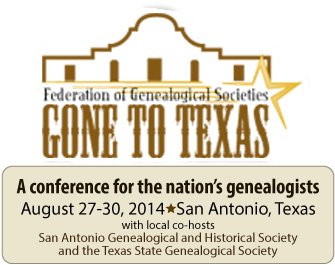
I’ll be at FGS 2014 in San Antonio: Will you?
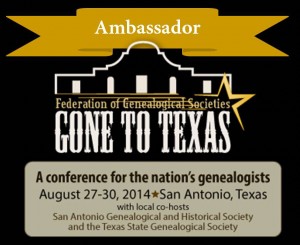 Now that I’m a proud Texan, it’s even more exciting that I’m speaking at “FGS 2014!”
Now that I’m a proud Texan, it’s even more exciting that I’m speaking at “FGS 2014!”
The annual meeting of the Federation of Genealogical Societies is in San Antonio, Texas, this year on August 27-30. Online registration is now open: register here by 1 July 2014 for an early-bird discount.
This year’s conference theme is “Gone to Texas. “This conference will offer over 160 educational sessions on records, strategies, and tools for genealogists of all levels,” says Josh Taylor, FGS President. “Sessions will be presented by some of the leading genealogists from the United States. Ten different sponsored luncheons will provide opportunities for networking.”
FGS 2014 Conference Highlights
I’ll be giving three talks at FGS 2014 and I’ll be in the vendor hall, too. Here are the session numbers and descriptions. I hope you’ll come by and say hello!
Here’s more of what you’ll find at FGS:
- Conference Sessions: A wide variety of genealogy-related lectures and workshops for all experience levels. Attendees will be able to learn about Texas and neighboring states research, African-American and ethnic origin research, military research, genetics, technology, migration, methodology and more.
- Exhibit Hall: The large exhibit hall will feature the latest software, books, maps, databases and gadgets on the market for genealogists and family historians, as well as information about genealogical organizations. Representatives of FGS member societies will staff their booths in the special Society Showcase area.
- Special Events: On Wednesday evening, local hosts San Antonio Genealogical and Historical Society and Texas State Genealogical Society invite registrants to an evening at the Institute of Texas Cultures, an amazing museum located directly behind the convention center. On Friday evening, The San Antonio Conservation Society hosts a festive evening with strumming guitars, shining horns, a capella voices of mariachis and local artisans at work at La Villita. The Conservation Society only hosts 10 of these events each year and FGS is excited to able to offer this. Details can be found at www.fgsconference.org.
- Focus on Societies: On Wednesday, August 27, 2014, sessions are jam-packed with ideas and tools to help societies promote themselves, increase membership, and develop sources of revenue. The day kicks off with a first ever, half-day workshop to develop a plan and tools to use to enhance and guide their society forward.
- Librarians’ Day: On Tuesday, August 26, 2014, ProQuest will sponsor a full-pre-conference day of sessions designed for librarians, archivists, and other information professionals serving family history researchers.
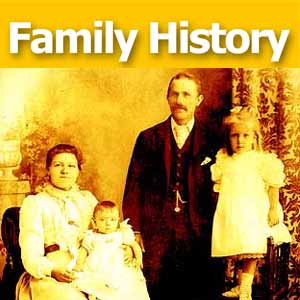
Family History Episode 25 – Using Civil Birth Records in Family History Research
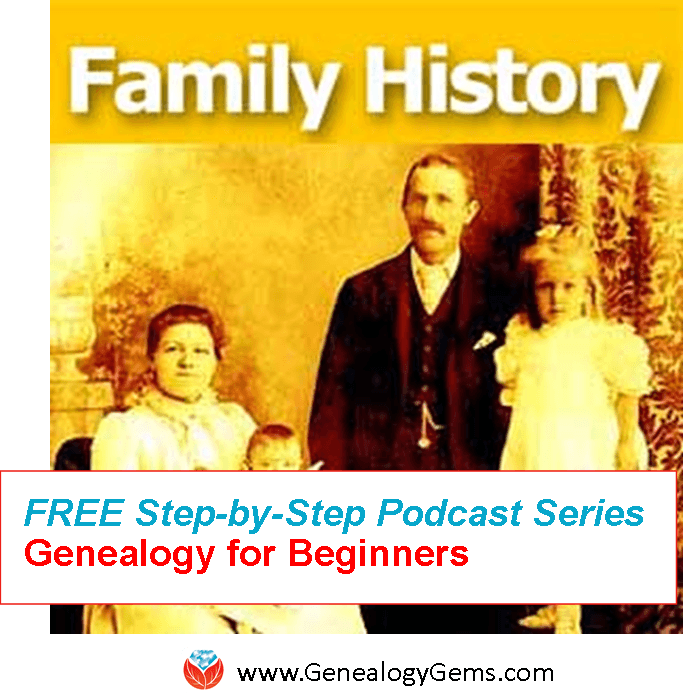
Listen to the Family History: Genealogy Made Easy podcast by Lisa Louise Cooke. It’s a great series for learning the research ropes and well as refreshing your skills.
Family History: Genealogy Made Easy
with Lisa Louise Cooke
Republished April 1, 2014
[display_podcast]
Download the Show Notes for this Episode
Welcome to this step-by-step series for beginning genealogists—and more experienced ones who want to brush up or learn something new. I first ran this series in 2008-09. So many people have asked about it, I’m bringing it back in weekly segments.
Episode 25: Using Civil Birth Records in Family History
In our last episode we covered marriage records. We finish up vital records in this episode by going back to the beginning: birth records.
There are two major categories: civil and church records. Today I’m bringing in professional genealogist Arlene H. Eakle, PhD, who will helps us to see the challenges we face and the success we can have locating civil birth records. (In Episode 26, Arlene will join me again to walk us through the world of church birth records.)
Here are some take-away tips from our discussion in this episode:
- When you start researching in a new area, learn when government birth records began to be kept. Every state and some cities began birth registration at different times. Today, in some states you order records before a certain date from the local government and more recent ones from the state vital records office. Do your research! Start with this Vital Records Chart from Family Tree Magazine.
- In the U.S., most government birth records were kept by the county, except in New England and independent cities. In the 20th century, the state took buy medication cart over jurisdiction of vital records in most states.
- Birth records often have the names of parents and child and the place and date of birth. You may also find parents’ birthplaces, marital status of parents and even the date of marriage.
- A single locale may have logged births in multiple sources, for example, for those who lived in or outside the city limits, or segregated records for blacks.
- The actual birth record may have been logged as part of a list of names on a columned form. Birth certificates are a modern thing!
- Some records have been digitized and indexed or microfilmed. Check the Family History Library catalog on FamilySearch.org first. If they have birth records, they’ll tell you whether they’ve been digitized or indexed on their site, or whether they’re available on microfilm.
- Of course, many birth records are also available on subscription websites like Ancestry.com, FindMyPast.com, MyHeritage.com and more. If you are a subscriber, check their online holdings, too.
- When ordering a birth record from a government office, they may type up a certificate to send you. That’s nice, but also ask for a photocopy of the original birth entry or record. There’s often more on the original record than the certificate—and you’ll minimize errors by looking at the real record.
Arlene H. Eakle, Ph.D., is the president and founder of The Genealogical Institute, Inc. and a professional genealogist since 1962. She holds both MA and Ph.D. in English History and an Associate degree in Nursing.
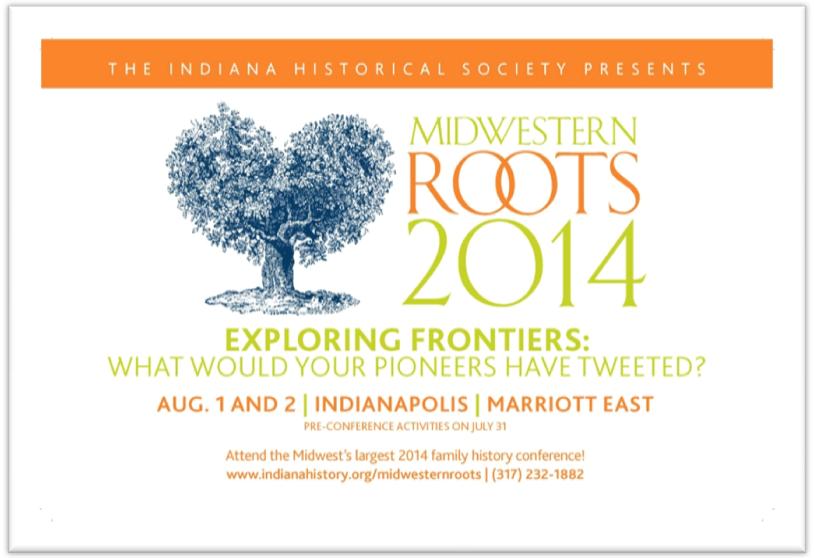
Midwestern Roots Registration Starts Today!
I have roots in Indiana and have longed to travel to Hoosier state to conduct some much needed genealogy research. So you can imagine how happy I 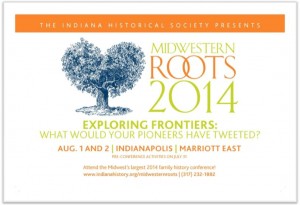 was to be invited to keynote at the upcoming Midwestern Roots 2014: Family History and Genealogy Conference being held August 1 and 2, 2014, Indianapolis, IN, at the Indianapolis Marriott East.
was to be invited to keynote at the upcoming Midwestern Roots 2014: Family History and Genealogy Conference being held August 1 and 2, 2014, Indianapolis, IN, at the Indianapolis Marriott East.
This year’s theme is a timely one: Exploring Frontiers: What Would Your Pioneers Have Tweeted? This conference promises to be a glorious melding of old and new with deep history sessions and the latest technology.
Here’s the scoop on the Midwestern Roots Conference:
Registration Opens March 26 with a $99 registration special price March 26-29, 2014.
Includes the two day conference and lunches.
Additional fee for banquet and some pre-conference activities.
Register online at www.indianahistory.org/
call (317) 232-1882 from 10 a.m.-5 p.m. Thursday through Saturday during the special offer.
The Midwestern Roots 2014 Conference is your chance to get updated on the latest technology changes in family history research, resources and methodology, and I’ll be exploring that in my keynote Future Technology and Genealogy: 5 Strategies You Need. You’ll also experience:
• More than 30 stimulating lectures from nationally known speakers Warren Bittner, Lisa Louise Cooke, Joan Hostetler, Amy Johnson Crow, Thomas MacEntee, James H. Madison, Anne Gillespie Mitchell, Daniel S. Poffenberger, Curt B. Witcher and more
• The Great Google Earth Game Show presented by Lisa Louise Cooke (this will be an interactive, FUN, outside the box kind of session topped off with prizes!)
• Hoosiers and A New History for the Twenty-First Century presented by James H. Madison
• A Guided Tour of Ancestry computer lab taught by Amy Johnson Crow and Anne Gillespie Mitchell from Ancestry.com
• Genealogy Resources Library Workshop
• Writing, document preservation and photo preservation workshops
• Family History Market and Book Fair – open to the public
See you at the Midwestern Roots 2014 Conference!





